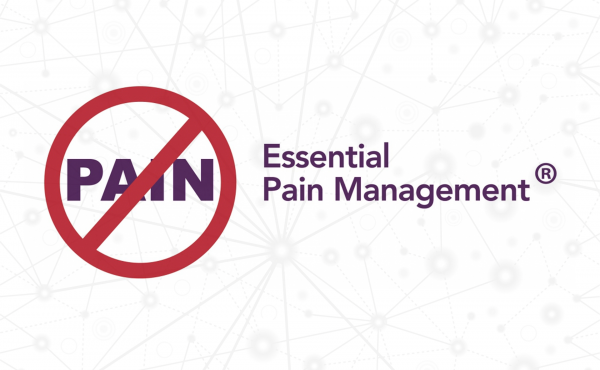e-PAIN
The resource for NHS workers who want to better understand and manage pain
e-PAIN uniquely distills the knowledge of a range of professionals into 12 modules made up of interactive sessions to meet the needs of a multidisciplinary audience. Registration is free to all NHS staff members, students and those with OpenAthens accounts.
What is e-PAIN?
e-PAIN is a multidisciplinary programme based on the International Association for the Study of Pain's recommended multidisciplinary curriculum for healthcare professionals learning about pain management.
e-PAIN is current, up to date and presented in an interactive way to make both basic and specialist knowledge accessible. Any module can be completed stand alone and you can download a certificate upon completion of each module. Sessions take on average 30 minutes to complete and modules have on average 5 sessions.
Collaborators
e-PAIN is a collaboration between the Faculty of Pain Medicine, the British Pain Society and e-Learning for Healthcare. It is provided by Health Education England.
The following modules are available:
This module provides an overview and introduction for non-specialists to the topic of Pain Management.
Sessions include:
Module 2 takes a more detailed look at acute pain.
The first session, Pharmacology for Acute Pain begins by considering the mechanisms of acute pain and how this can be managed pharmacologically. The difference between nociceptive and neuropathic pain are then covered. Finally, the three main treatments for nociceptive pain are discussed.
The second session, Pain Assessment and Basic Principles of Prescribing, looks at the assessment of pain, including the commonly used pain assessment tools and the siutations in which they may be used. The management of background and breakthrough pain, including the use of opioids, is then considered.
The third session, Acute Pain Management of Special Populations - Renal, Hepatic and Sickle Cell, covers the initial management of acute pain in patients with chronic kidney disease, liver dysfunction and sickle cell disease.
The fourth session, Adjuvant Analgesics and Regional Anaesthesia, explores adjuvantanalgesic including the mechanisms, side effects, pharmakinetics and routes. It also covers regional anaesthesia, specifically wound infusion, spinal block and epidurals.
Introduction to Acute Pain
Sessions include:
- Pharmacology for Acute Pain
- Pain Assessment and Basic Principles of Prescribing
- Acute Pain Management of Special Populations - Renal, Hepatic and Sickle Cell
- Adjuvant Analgesics and Regional Anaesthesia
The module editor is Dr Jane Quinlan.
This module explores persisting or chronic pain and what can be done to help people learn self-management skills.
Sessions include:
- Biopsychosocial Model in Pain Management
- Chronic Pain Management
- Multidisciplinary Management of Chronic Pain
- Psychological Assessment and Approach to Treatment
- Ways of Supporting Pain Self-Management Strategies
The module editor is Dr Paul Wilkinson.
This module looks at the treatments available for pain, both pharmacological and non-pharmacological.
- Non-Steroidal Anti-Inflammatory Drugs
- Paracetamol
- Opioids - Basic Principles
- Opioids for Persistent Pain: Overview and Evidence
- Opioids for Persistent Pain: Using Opioids in Practice
- Local Anaesthetics
- Antidepressants and Anticonvulsants
- Multimodal Analgesia
- Assessing Treatment Effectiveness
- Interventional Procedures for Pain Relief
- TENS and Alternative Treatments
The module editor is Dr Roger Knaggs.
This Module covers important persisting pain conditions that together make up a significant proportion of the burden of pain.
Sessions include:
- Primary Headache
- Secondary Headache
- Facial Pain - Principles and Management
- Pelvic Pain - Male and Female
- Visceral Pain
- Central and Widespread Chronic Pain
- Complex Regional Pain Syndrome
The module editor is Dr John Hughes.
This module covers pain related to the musculoskeletal system.
Sessions include:
- The Assessment and Management of Osteoarthritis
- Stratified Care of Low Back Pain
- Supporting People to Stay at Work or Return to Work
- Pain Management in Inflammatory Arthritis
- The Assessment and Management of Vertebral Fractures in Osteoporosis
- Low Back Pain and Sciatica
This module deals with the diagnosis and evaluation of neuropathic pain and then looks at various instances of neuropathic pain and practical issues with the use of neuropathic pain medicines.
Sessions include:
- Diagnosis and evaluation of Neuropathic pain
- Common Chronic Neuropathic Pain Medicine
- Practical Issues in Neuropathic Pain Medicine
The module editor is Lesley Colvin.
This module will raise awareness of developmental, family, therapeutic and organisational issues that all need to be addressed in order to better manage pain in children.
Sessions include:
- Pain in Children is Different
- Assessment of Children's Pain
- Acute Pain in Children
- Chronic Pain in Children
- Musculoskeletal Pain in Children
The module editor is Dr Richard Howard.
This covers the effect of pain in a number of special populations.
Sessions include:
This module examines pain in cancer patients and looks at the causes and aetiology of that pain and its management via both drug and non-drug therapies.
Sessions include:
- Causes and Aetiology of Pain in Cancer
- Pharmacological Cancer Pain Management
- Non-Pharmacological Cancer Pain Management
- Pain in Cancer Survivors
The module editor is Paul Farquhar-Smith.
This module explains the physiological and anatomical aspects of pain and pain management and makes use of a number of existing sessions drawn from the award winning e-Learning Anaesthesia programme.
Sessions include:
- This module provides an introduction to the essential pain management (EPM) framework.
It also describes the essential pain management (EPM) resources and how to use or adapt them to teach a variety of different healthcare workers.
Finally, it explains how to use the essential pain management (EPM) framework at medical student level, in preparation for work as a foundation doctor.
Sessions include:
Sample sessions
There are two sample sessions available to try that can be completed without the need to logon to e-Learning for Healthcare:
e-PAIN Library
BJA Education (formerly CEACCP) is a joint venture between the British Journal of Anaesthesia and the Royal College of Anaesthetists. Together, they have produced many articles related to Pain which can now be found in the e-PAIN eLibrary module.
The success of the award-winning e-learning suite, e-LA, e-ICM and e-PAIN, is truly remarkable. These resources are now a cornerstone of lifelong learning for all professionals in anaesthesia, intensive care and pain medicine in the UK and increasingly around the world.
Already have an eLfH account?
If you have already registered with e-Learning for Healthcare, please add e-PAIN to your programmes. This can be done by ticking e-PAIN in the 'My Programmes' section (please note, it can take 24 hours for the programme to become available to you).
e-Learning Anaesthesia (e-LA)
Visit the RCoA website for information on the e-LA e-learning programme.
Non-NHS and overseas doctors
For those without an NHS email address, you can purchase access to e-PAIN as well as other e-learning modules through the community interest company e-Integrity.
Interested in e-PAIN?
Register for your free account with
eLearning for Health to get started.



